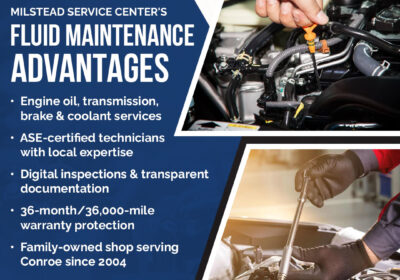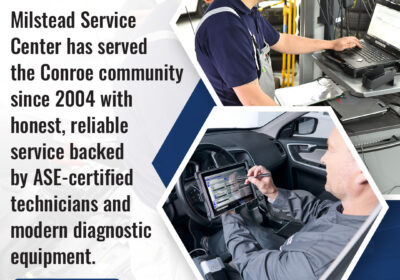Transmission fluid plays a role in nearly every function of a vehicle’s drivetrain. Whether it’s an automatic, manual, or CVT system, the fluid maintains the internal pressure needed for gear changes and protects key components from wear. Heat and friction can break down the chemical structure of transmission fluid. When dirty or degraded, the fluid loses its ability to lubricate. It can increase friction inside the transmission and lead to overheating, slipping gears, and even transmission failure. In this article, Milstead Service Center explains the types of transmission fluid used in today’s vehicles, the signs that a change is needed, and how proper service can lower long-term repair costs. Our goal is to help drivers get more life out of their vehicles and avoid unnecessary auto repairs in Conroe, TX.

What Transmission Fluid Does Inside Your Vehicle
Reducing Internal Friction
Transmission fluid creates a thin, protective barrier that prevents the metal parts of the system from grinding against each other. This barrier reduces friction between gears, bearings, and clutch packs. High friction can cause the component to wear out faster. This leads to poor performance or full system failure. Fluid leakage or degradation is a leading contributor to transmission failure, as noted by multiple industry sources, including rebuilders, friction specialists, and service providers.
Checking fluid conditions can identify early wear before it becomes a major auto repair. In both automatic and manual transmissions, clean fluid prevents internal scarring that leads to slipping or hesitation during shifts.
Keeping Components Cool Under Load
Transmission fluid carries heat away from the internal parts of the transmission, especially during heavy use. Towing, stop-and-go driving, and hot Texas summers can raise fluid temperatures well above 200°F. At that point, the fluid begins to break down, increasing the chance of overheating. Overheated transmission fluid loses viscosity and can no longer protect parts effectively.
According to transmission manufacturers, every 20-degree rise in fluid temperature above 200°F cuts fluid life by half. This makes cooling a critical part of long-term maintenance. For residents of Conroe, where heat is a constant factor, this risk is higher. Routine service at Milstead Service Center, your trusted Conroe, TX, auto repair shop, includes fluid inspections that can catch this kind of early degradation.
Assisting Gear Engagement
Transmission fluid applies hydraulic pressure that helps gears engage smoothly at the right time. In automatic systems, the fluid works with the transmission pump and valve body to direct pressure where it’s needed. This is what allows a car to shift without jerking. When fluid is low or contaminated, gear changes may be delayed, harsh, or fail entirely.
Manual transmissions rely on transmission oil or gear oil to reduce resistance during gear shifts. Without enough lubrication, you may hear grinding or feel resistance when shifting. These are common signs that the fluid needs service.
Customers often visit auto repair shops after noticing these signs. Transmission fluid issues can mimic other drivetrain problems, so accurate diagnostics are key. For anyone needing auto repair related to shifting issues, checking fluid quality is a good starting point.
Choosing the Right Fluid for Your Transmission
Automatic Transmission Systems
Each automatic transmission system is designed to work with a specific fluid formula. Automatic transmission fluid (ATF) lubricates the parts, transfers hydraulic pressure, cleans internal parts, and helps with cooling. Using the wrong fluid can cause delays in shifting or even internal damage.
For most vehicles, fluid types vary by make and model. Some systems require synthetic blends for better heat resistance, while others use older formulas. At Milstead Service Center, our technicians reference factory specifications to match the correct ATF to your car.
Fluid Formulas by Vehicle Manufacturer
Manufacturers design fluids to match the materials and tolerances inside their transmissions. For example, Honda uses specific formulas with friction modifiers for smoother shifting. Ford’s Mercon fluids differ from GM’s Dexron series. Toyota and Nissan also have unique ATF requirements.
Substituting one for the other can cause poor shift quality or accelerate wear. Fluid selection needs to follow OEM guidelines, especially for imported vehicles. This ensures performance and protects the warranty, especially for newer models.
Signs of Compatibility Issues
The wrong fluid can lead to hard shifting, overheating, or slipping during acceleration. These problems usually appear within days or weeks of a fluid change. Other signs include delayed engagement when shifting into drive or reverse, noise from the transmission, or warning lights. These issues can be avoided by verifying the fluid type before performing the service.
Manual Transmission Setups
Manual transmissions may use gear oil, motor oil, or manufacturer-specific fluids. Not all manual transmissions use the same fluid. Some require 75W-90 gear oil, while others may call for ATF or even engine oil. Always refer to the owner’s manual or manufacturer documentation.
Inaccurate fluid selection can lead to gear noise, difficulty shifting, or early bearing wear. Our Conroe, TX, auto repair shop services domestic and manual transmissions using the correct products for each drivetrain.
When Standard Gear Oil Is Used
Many manual transmissions rely on standard gear oil to protect high-contact parts. Gear oil is thicker than ATF and is designed for heavy-duty gear contact. It prevents damage in systems that don’t rely on hydraulic pressure. It’s commonly used in trucks, older cars, and off-road vehicles.
However, gear oil is not a one-size-fits-all solution. Some newer manuals require lighter-weight oils. Using gear oil in the wrong system can affect shift quality or create resistance in cold weather.
Cases Where Specialized Fluids Are Required
Some transmissions need specially formulated fluid for high heat, friction, or pressure loads. This is true in high-performance or all-wheel-drive vehicles. For example, certain BMW and Mercedes models use lifetime-fill synthetic fluids that match specific wear tolerances. Subaru CVTs also require exact fluid blends to prevent slipping and vibration.
Failing to use the right fluid in these systems can lead to permanent damage or void the warranty. At Milstead Service Center, we have access to the correct specs for these specialized systems.
CVT and Dual-Clutch Transmissions
CVT and dual-clutch units require unique fluids that are not interchangeable with standard ATF or gear oil. Continuously variable transmissions (CVTs) rely on special fluid for belt and pulley operation. Dual-clutch transmissions (DCTs) need low-viscosity oil to manage both hydraulic control and clutch actuation. Using the wrong fluid can cause judder, overheating, or clutch failure. For customers with CVT-equipped vehicles, accurate fluid selection is critical.
Why Standard Fluids Can’t Be Substituted
Standard ATF or gear oil often lacks the additives or friction properties needed for modern transmission designs. Some universal fluids claim wide compatibility, but they often miss the specific detergents, modifiers, or viscosity ranges manufacturers call for. These differences may not show immediate symptoms, but can shorten transmission life.
At Milstead Service Center, we don’t rely on generic products. Our auto repair team follows OEM specifications to make sure each transmission gets the exact fluid it needs.
What Can Go Wrong When Fluid Is Old or Contaminated
Overheating and Internal Wear
Old or dirty fluid can’t keep the transmission cool or protect internal components. As fluid ages, it loses its ability to carry heat away from gears and clutches. Sludge and debris reduce their flow and insulation properties.
Without proper cooling, metal parts expand under stress. Bearings, seals, and valve bodies wear faster. This can lead to total failure, requiring a full rebuild or replacement. At Milstead Service Center in Conroe, TX, we recommend timely fluid changes to reduce these risks.
Delayed or Harsh Gear Changes
Contaminated fluid disrupts hydraulic pressure, leading to poor shift quality. Transmission fluid controls the pressure needed for smooth gear changes. When it thickens with age or collects debris, it can’t flow or provide the proper pressure needed for the system.
Drivers often notice hesitation, harsh engagement, or random gear changes. These symptoms may seem like major mechanical problems, but are often solved by flushing and replacing the fluid with the correct type.
Fluid Breakdown and Clutch Damage
Worn fluid can’t protect clutches from friction, leading to burn marks and slippage. Transmission fluid can break down chemically. Additives degrade, oxidation occurs, and the ability to reduce friction weakens. As a result, clutch plates inside the transmission begin to slip, overheat, and wear out.
Once the friction material is damaged, the transmission can no longer hold gears properly. You may notice surging, loss of drive, or grinding sounds. This is common in high-mileage vehicles that have never had a fluid change.
At Milstead, we inspect the fluid condition during routine maintenance to catch early signs of breakdown before permanent damage occurs.
How to Know It’s Time for a Transmission Fluid Service
Manufacturer Service Intervals
Depending on your vehicle and driving conditions, transmission fluid needs to be replaced every 30,000 to 60,000 miles. Automakers list service intervals in the owner’s manual. Some models using synthetic fluid may go longer, but that doesn’t apply to all driving styles. Stop-and-go traffic, heavy towing, or high temperatures can shorten the fluid’s lifespan.
At Milstead Service Center, we review factory-recommended intervals during routine maintenance and let you know when service is due based on mileage, wear, and fluid condition.
Symptoms That Point to Fluid Problems
Performance issues signal that your fluid is low, dirty, or breaking down. While mileage is a guide, certain symptoms may appear sooner if the fluid is no longer effective. These warning signs include shift delays, surging between gears, or slipping under load. We regularly inspect for these signs during scheduled maintenance at our Conroe, TX, auto repair shop and use fluid condition as a key indicator of system health.
Vibration During Shifting
Shaking or vibration during gear changes means the fluid isn’t protecting the clutches or valve body properly. When fluid loses its friction modifiers or thickens, gears may not engage smoothly. This results in vibration, especially at lower speeds or under load.
In some cases, flushing and replacing the fluid solves the problem. If ignored, the issue can worsen and lead to costly damage. Our technicians at Milstead Service Center will check for this during test drives and diagnostics.
Strange Noises or Smells
Burnt smells or whining noises from the transmission indicate that the fluid is overheating or contaminated. Clean transmission fluid has a sweet, slightly oily scent. When it smells burnt, it’s often due to overheating or friction wear. You might also hear humming, clunking, or whining when shifting.
At Milstead Service Center, we can check fluid color and odor during a standard inspection. These checks are part of our approach to help you prevent major auto repairs in Conroe, TX.
Unexpected Leaks
Red or brown fluid under your vehicle signals a leak that needs immediate attention. Transmission systems are sealed, so any sign of fluid on the ground is abnormal. Common leak points include the pan gasket, cooler lines, and output shaft seals. Low fluid levels from leaks can cause poor shifting, overheating, or total failure. We use dye testing and pressure inspections at our auto repair shop to trace leaks quickly and repair them before major damage occurs.
What to Expect During a Fluid Change at Milstead Service Center
Drain and Fill vs. Full System Flush
A drain and fill replaces about half of the fluid, while a flush exchanges nearly all of it. At Milstead Service Center, we offer both methods based on your vehicle’s condition and manufacturer guidelines. A standard drain and fill is ideal for regular maintenance. It removes the old fluid from the pan and adds new fluid without disturbing older deposits.
A full system flush is recommended if the fluid is dark, smells burnt, or contains debris. This process uses a machine to push out nearly all of the old fluid and replace it with clean fluid, restoring better performance for most automatic and CVT systems.
Filter Replacement and Seal Inspection
Filters and seals are checked during service to prevent future transmission issues. Many automatic transmissions have internal filters that trap metal particles and clutch material. If these clog, fluid flow drops, and causes overheating or harsh shifting. During service, technicians at our Conroe, TX, auto repair shop check the filter and pan for debris. If your transmission has a serviceable filter, we replace it to maintain proper flow.
We also inspect key seals, such as the pan gasket and output shaft seal, for wear or leakage. Finding issues early prevents larger problems later.
Fluid Quality Checks with Every Visit
Technicians check fluid color, level, and smell as part of every routine inspection. Even if you’re not due for a fluid change, our technicians will check transmission fluid during regular service visits. Clean fluid should be red or pink, with no strong odor. If it’s brown, dark, or smells burnt, it’s time to replace it.
During maintenance appointments at Milstead Service Center, our team includes these checks as part of our process. This identifies early signs of trouble and gives you time to plan for service before your vehicle requires major auto repairs in Conroe, TX.
Schedule a Transmission Inspection in Conroe, TX

Routine transmission service protects your vehicle from costly auto repairs. If you’ve noticed delayed shifting, fluid leaks, or unusual smells during operation, now is a good time to bring your car in. Staying on top of fluid changes prevents overheating, gear wear, and transmission failure over time.
At Milstead Service Center, we provide professional help, from basic fluid service to full repairs, for any transmission problem. Our ASE-certified technicians follow manufacturer guidelines for each make and model, including vehicles with automatic, manual, CVT, or dual-clutch transmissions. We use the correct fluids, inspect filters and seals, and perform quality checks to make sure your system stays in good working order.
We offer convenient appointments, accurate diagnostics, and honest service backed by decades of experience performing auto repairs in Conroe, TX. Whether you drive a daily commuter or a heavy-duty truck, Milstead Service Center is ready to help you keep your transmission running reliably.
Keep your transmission in top shape—schedule your service today with Milstead Service Center—call (936) 441-3500 to speak with a technician or book your transmission service appointment.




